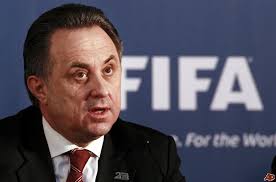By Paul Nicholson
August 20 – Russian sports minister Vitaly Mutko has turned down a FIFA proposal to reduce the number of stadiums and cities that will host the 2018 World Cup. FIFA president Sepp Blatter met with Russian president Vladimir Putin as well as Mutko in Sochi last weekend and suggested a possible reduction.
But the Russians, who have embarked on an exhaustive assessment of infrastructure planning themselves, feel there is no need for change from the 12 stadia in 11 cities hosting plan – FIFA are suggesting 10 stadia in nine cities.
However, Mutko did say that if a decision to drop a venue was made, that would have to happen in the next two months.
Speaking to the ITAR-TASS news agency, Mutko said: “The plan that we will have 12 stadiums in 11 cities, which will host matches at the World Cup is not changing. FIFA recommends that we should have 10 stadiums in nine cities, which include two arenas in Moscow. This week delegates from FIFA will visit us and we will be taking them to all the host cities. Tomorrow they will be going to Saransk.”
As if to reinforce Mutko’s point the deputy Minister of Construction, Architecture and territorial development of the Rostov region, Nikolay Bezuglov, released more information on the World Cup infrastructure to be built there. Bezugolov said that the cost of the construction of the Rosvov-on-Don stadium would be Rubles 21.2 billion ($584 million).
Earlier it was announced that the stadium for the 2018 World Cup in the Rostov region would be completed in 2016. There is a further review of the Rostov plans on August 30, with the stadium scheduled to be completed in 2016. There is also a comprehensive plan for improved regional infrastructure with work also taking place on the construction of new roads and hotel complexes. The total cost of the infrastructure in the Rostov region is about Rubles 85.4 billion (S2.4 billion).
At the same time the Russians have announced that the plans for the stadium build in Volgograd had been approved with the construction of the 45,000-seat venue being funded by the state budget. Volgograd was one city that looked to be in threat of losing its host status, though Mutko has worked hard to keep the city on the 2018 schedule.
Blatter’s concern has been to avoid stadium redundancy once the World Cup leaves, as happened in South Africa with three stadia “where it is a problem of what you do with these stadiums,” and also to avoid the logistical, high cost and late-running issues that caused havoc in the build-up to the World Cup in Brazil this summer.
For the Russians the situation is different and while the suggestion from FIFA appears to have been considered, the Russian progress and planning in-country is considerably further advanced than either South Africa and Brazil were, with resources committed, projects underway and money already being spent.
“If this question is not decided during their (FIFA’s) executive (committee) meeting in October then it will be too late to change anything, as we are planning to start construction of the stadiums in 2015,” said Mutko.
Different figures have been reported for the cost of the infrastructure build in Russia. Government figures show current costs running at about $17.5 billion but Mutko said that $20 billion had been allocated to host 2018.
The 11 cities that are on the schedule to host the 2018 World Cup are Moscow (two stadiums), St Petersburg, Sochi, Kazan, Kaliningrad, Volgograd, Rostov-on-Don, Nizhny Novgorod, Samara, Saransk and Yekaterinburg. Volgograd, Kaliningrad and Yekaterinburg were cities previously reported as being under threat of losing hosting status.
Contact the writer of this story at moc.l1745019487labto1745019487ofdlr1745019487owedi1745019487sni@n1745019487osloh1745019487cin.l1745019487uap1745019487

